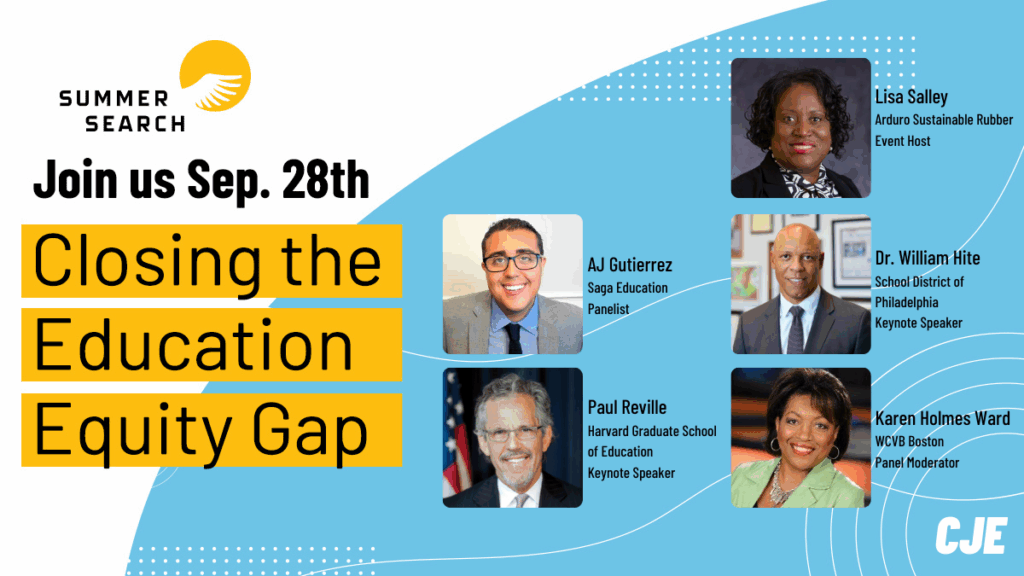October 5, 2021
CJE: Closing the Education Equity Gap
Share

“Education then, beyond all other devices of human origin, is the great equalizer of the conditions of men, the balance-wheel of the social machinery.” – Horace Mann
On Tuesday, September 28, 2021, Summer Search presented Closing the Education Equity Gap, the third iteration of Championing for Justice and Equity (CJE), a three-year conversation on race, justice, and systemic inequity.
In April of 2021, Summer Search kicked-off CJE with A Racial Reckoning: Navigating with Grace and Excellence, where our panel of experts in the academic world, Corporate America, and the Summer Search community, discussed a variety of EDI policies and practices, analyzing what works and what doesn’t.
In June, CJE dug deeper into diversity, equity, and inclusion (DEI) in the workplace with Racially Speaking: The Future of Work.
Hosted by Philadelphia School District Board of Education Member Lisa Salley, Closing the Education Equity Gap brought together Harvard Professor Paul Reville, Philadelphia School District Superintendent Dr. William Hite, and Saga Education Co-founder and Summer Search Boston Alumnus AJ Gutierrez to examine racial equity in the education system and understand how and why school opportunities, outcomes, and environments differ along racial lines.

Attendees took away with them a greater understanding of:
- Education reform and policy development;
- How race plays a role in opportunities and outcomes for students;
- How COVID exacerbated learning gaps along racial lines in urban areas;
- The future of education equity and how we all play a role.
To borrow from Dr, Hite, even with the best school reform, disparity exists because we live in an inequitable society. The rich have access to opportunity. Low-income Americans do not. But, as per Mr. Reville, within every crisis there is danger, but also opportunity.
We must capitalize on this moment in time to create better and more equitable educational outcomes for all Americans. How can we do it? We invite you to start with Championing for Justice and Equity: Closing the Education Equity Gap.
The Conversation.
- 00:34 – 04:00: Introduction – Lisa Salley
- 04:37 – 22:35: Paul Reville
- 22:43 – 32:46: Dr. William Hite
- 32:57 – 55:03: Panel Discussion and Q&A
Selections.
Paul Reville – “We’re in the middle of…an earthquake in our sector of education [and] in our entire society…change and uncertainty and threat are still real parts of our day-to-day life. I liken it a bit to an earthquake that upends everything and causes people to need to rethink where they are, reconnect, rebuild, reestablish normalcy, and reimagine a different kind of a future.”
“[The pandemic] revealed to the broader society gross inequities of the lives of people many of our school systems serve. The gaps in health and mental health services and support. The gaps in food [security]. The instability of housing. The number of folks who are [unhoused]. The variable access to internet and education technology, to name just a few…Society became very aware that these needs weren’t being met because schools were closed and there began to be a broader sense of what it would take to make our young people successful in society.”
View and download Mr. Reville’s PPT presentation.
Dr. William Hite – “In education, we tend to design systems that provide the same thing to everyone as if everyone needs the same thing to in order to achieve. That’s happened since…the 1800s…yet, here in 2021, we’re still grappling with all the ways to make education accessible and, more importantly, equitable for all students, especially those from historically-marginalized communities. The core issue…is that the very system that’s desiring to see education as the great equalizer [happens] to be the same system creating the inequities upholding the system-wide impact…As we move through [education reform], we have to have a clear understanding of equality and equity.”
AJ Gutierrez – “I was born and raised in Boston, Mass in Villa Victoria, which is a low-income community. A community, by the way, with a rich history of comm activism and volunteerism. My mother cared deeply about my success and education. Despite all of those things, I still struggled academically. As [Dr. Reville] highlighted, there’s so many big challenges that affect[ed] my ability to be successful as a student…that changed when I had the opportunity to work alongside a tutor…[They] connected with me, built my foundational skills, conceptual understanding of what’s going on in class, which allowed me to thrive academically…We recognize, at Saga Education, a big part of what’s going to be useful in the next derivative of education is going to be meeting students where they are and getting them where they need to be.”
CJE returns in January 2022 with Racial Injustice: Criminal Justice Solutions.

